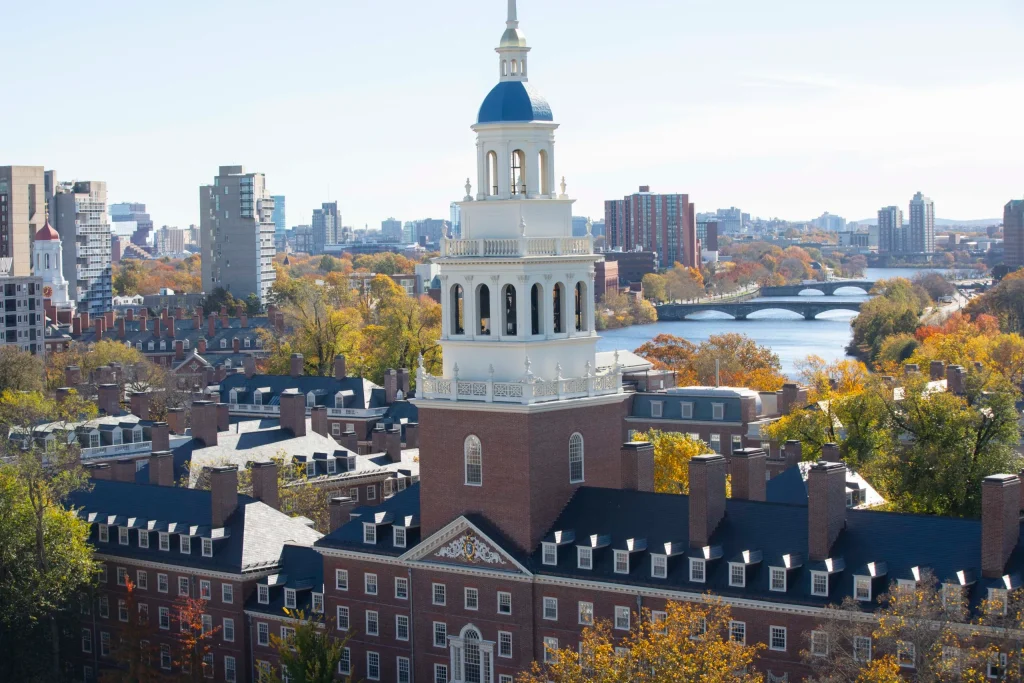Harvard University seeks Wall Street bailouts after losing billions in funding by rejecting Trump's demands.
Harvard University is resisting the Trump administration's freeze on over $2 billion in funding by seeking financial support from Wall Street. In a letter to the White House on Monday, the Ivy League institution declared its refusal to adhere to the administration's demands related to its anti-Semitism campaign. Shortly thereafter, the administration imposed a freeze on $2.26 billion in multi-year grants and $60 million in multi-year contracts for the university.
However, turning to Wall Street, Harvard has already issued $750 million in taxable bonds, a strategy aimed at softening the impact of potential federal funding cuts, The Wall Street Journal reported.
'The University will not surrender its independence or relinquish its constitutional rights,' Harvard President Alan Garber wrote in a letter to the community on Monday.
'No government - regardless of which party is in power - should dictate what private universities can teach, whom they can admit and hire, and which areas of study and inquiry they can pursue.'
Trump’s Response and the Government’s Demands
President Trump has since reacted to Harvard in a post on Truth Social, asserting that the Ivy League is 'endorsing illness'.
'Perhaps Harvard should lose its Tax Exempt Status and be Taxed as a Political Entity if it keeps pushing political, ideological, and terrorist inspired/supporting “Sickness?” Remember, Tax Exempt Status is totally contingent on acting in the PUBLIC INTEREST!' he wrote.
Earlier this month, the Trump administration task force on antisemitism sent a letter to the renowned school, demanding it follow nine specific measures to continue receiving nearly $9 billion in grants and contracts.
'The United States has invested in Harvard University's operations because of the value to the school of scholarly discovery and academic excellence,' the administration wrote in the letter.
'But an investment is not an entitlement.'
Among the demands outlined were merit-based hiring and admissions, the cessation of DEI programs, external oversight of antisemitism, and protections for whistleblowers. Furthermore, the directives included a prohibition on face masks, seemingly aimed at pro-Palestinian demonstrators.
The government also advocated for intervention in educational settings, urging 'necessary modifications' to 'tackle bias, enhance viewpoint diversity, and eliminate ideological dominance'—elements the task force claimed contribute to anti-Semitic harassment. While acknowledging that some demands aim to address anti-Semitism on campus, President Garber emphasized that most represent a direct governmental intrusion into the institution's intellectual landscape. On Monday, Garber replied to the administration, ultimately declaring that Harvard would not adhere to the government's proposed agreement.
Harvard Will Fight Trump’s Demands _ News _ The Harvard Crimson
Harvard’s Commitment to Academic Freedom and Legal Pushback
In the letter, Garber stated that the demands violated the university's First Amendment rights and 'exceeds the statutory limits of the government's authority under Title VI,' which prohibits discrimination against students based on their race, color, or national origin.
'These ends will not be achieved by assertions of power, unmoored from the law, to control teaching and learning at Harvard and to dictate how we operate,' he wrote.
'The work of addressing our shortcomings, fulfilling our commitments, and embodying our values is ours to define and undertake as a community.'
The Department of Education's Joint Task Force to Combat Anti-Semitism quickly moved to freeze billions in federal funding to the university, signaling a significant escalation in enforcement.
The frozen funds have supported the school’s 'ground-breaking' research in engineering, medical, and scientific fields for over three-quarters of a century.
'These innovations have made countless people in our country and throughout the world healthier and safer,' the letter said.
'New frontiers beckon us with the prospect of life-changing advances - from treatments for diseases such as Alzheimer’s, Parkinson’s, and diabetes, to breakthroughs in artificial intelligence, quantum science and engineering, and numerous other areas of possibility,' it continued.
'For the government to retreat from these partnerships now risks not only the health and well-being of millions of individuals but also the economic security and vitality of our nation.'
Massachusetts Governor Maura Healey recently stood up for Harvard University, praising the school for pushing back against what she called the Trump administration’s "brazen attempt to bully schools and weaponize the US Department of Justice under the false pretext of civil rights," as reported by The Harvard Crimson.
Department of Education Responds to Harvard's Defiance
But the Department of Education (DOE) wasn’t exactly thrilled with Harvard’s stance. They wasted no time firing back, accusing the university of having a 'troubling entitlement mindset,' suggesting it had failed to meet 'intellectual and civil rights conditions.'
This clash between the administration and Harvard has ignited strong reactions across the board. A group of Harvard alumni, feeling the pressure, wrote to university leaders urging them to take a firm stand. They called on the university to "legally contest and refuse to comply with unlawful demands," arguing that these demands jeopardize the core values of academic freedom and university self-governance.
The tension didn’t stop at letters. Over the weekend, protests erupted not only from Harvard students and faculty but also from residents of Cambridge, all of whom were rallying against what they saw as an overreach by the government. The American Association of University Professors even filed a lawsuit on Friday, challenging the funding cuts. The lawsuit contends that the Trump administration didn’t follow the proper procedure under Title VI, which includes notifying both the university and Congress before making such drastic funding decisions.
The legal action also accuses the government of trying to impose its political views on Harvard and limit speech it doesn’t agree with. WSJ reported that the lawsuit paints the administration’s actions as an attempt to control what can and can’t be said on campus.
This moment of reckoning highlights a stark contrast with other Ivy League schools. Columbia, for instance, didn’t hesitate to give in to Trump’s demands weeks ago, aligning itself with the administration’s agenda.
Harvard isn’t alone in being targeted by this pressure campaign. The Trump administration has also frozen federal funds for other prestigious schools, including the University of Pennsylvania, Brown, and Princeton. The goal is clear: get these institutions to fall in line with the administration’s wishes.
The Department of Education has doubled down in its response to Garber, accusing Harvard of exhibiting an entitled mindset and failing to live up to its obligations on intellectual and civil rights. The stakes have never been higher, and it’s clear that the administration is digging its heels in.
Now, Harvard is turning to Wall Street for help. The university argues that if the government pulls back from its funding partnerships, the consequences will ripple far beyond just the school. Harvard warns that such a move would 'risk not only the health and well-being of millions of individuals but also the economic security and vitality of our nation.'
This fight comes on the heels of Harvard’s handling of the ongoing Gaza conflict, which has sparked widespread controversy. The violence, which has claimed over 50,000 Palestinian lives, according to Gaza's health ministry, has drawn accusations of war crimes and genocide, claims Israel denies. Harvard, like many other universities, faced mounting criticism for its position, particularly regarding campus discussions and protests.
This pressure led to the resignation of former President Claudine Gay, who faced calls for accountability over the university's response to antisemitism allegations tied to campus protests.
The Trump administration has seized on these issues, arguing that schools like Harvard failed to properly address antisemitism. However, Harvard has strongly rejected these accusations. In a letter sent to the task force on Monday, the university’s legal team emphasized that Harvard had made 'significant strides' over the past 15 months in addressing these concerns.
'Harvard is committed to fighting antisemitism and other forms of bigotry in its community,' the letter states. 'Antisemitism and discrimination of any kind not only are abhorrent and antithetical to Harvard’s values but also threaten its academic mission.'
The letter also pointed to specific steps Harvard has taken, such as implementing new disciplinary measures, launching programs aimed at combating bias, and improving safety and security. The university has also worked to foster civil discourse and encourage ideological diversity.
'As a result, Harvard is in a very different place today from where it was a year ago,' the letter reads.
In other words, Harvard is emphasizing that these efforts aren’t just about compliance—they’re about strengthening the community and ensuring a place where everyone can thrive. 'These efforts, and additional measures the university will be taking against antisemitism, not only are the right thing to do but also are critical to strengthening Harvard’s community as a place in which everyone can thrive,' the letter continues.
Historians have called the Trump administration’s actions an unprecedented intrusion into university rights. Universities, they argue, have long been viewed as extensions of the First Amendment, a belief the Supreme Court has upheld for decades. And now, this battle over funding and free speech is more than just a fight between Harvard and the government—it’s about setting a dangerous precedent for universities nationwide. What’s happening in Cambridge could impact campuses across the country, and the outcome could shape the future of academic freedom for years to come.
📰 Other Stories You Might Like
-
Charges Dropped in Patriots Fan Stadium Death
Prosecutors dismiss charges against two men after a deadly confrontation at Gillette Stadium, citing insufficient evidence and self-defense. -
Rapper Tay-K47 Found Guilty in Chick-fil-A Murder Case
The controversial rapper faces another murder conviction, this time for a 2017 killing in a Chick-fil-A parking lot. -
Jail Healthcare Provider NaphCare Held Liable in Inmate’s Death
A federal court finds NaphCare responsible for the death of Cindy Lou Hill, citing gross medical neglect in a Washington jail. -
Tesla Loses Defamation Case Against Former Engineer
The electric car giant suffers a legal blow after a court tosses its win in a defamation suit due to jurisdictional missteps.





















